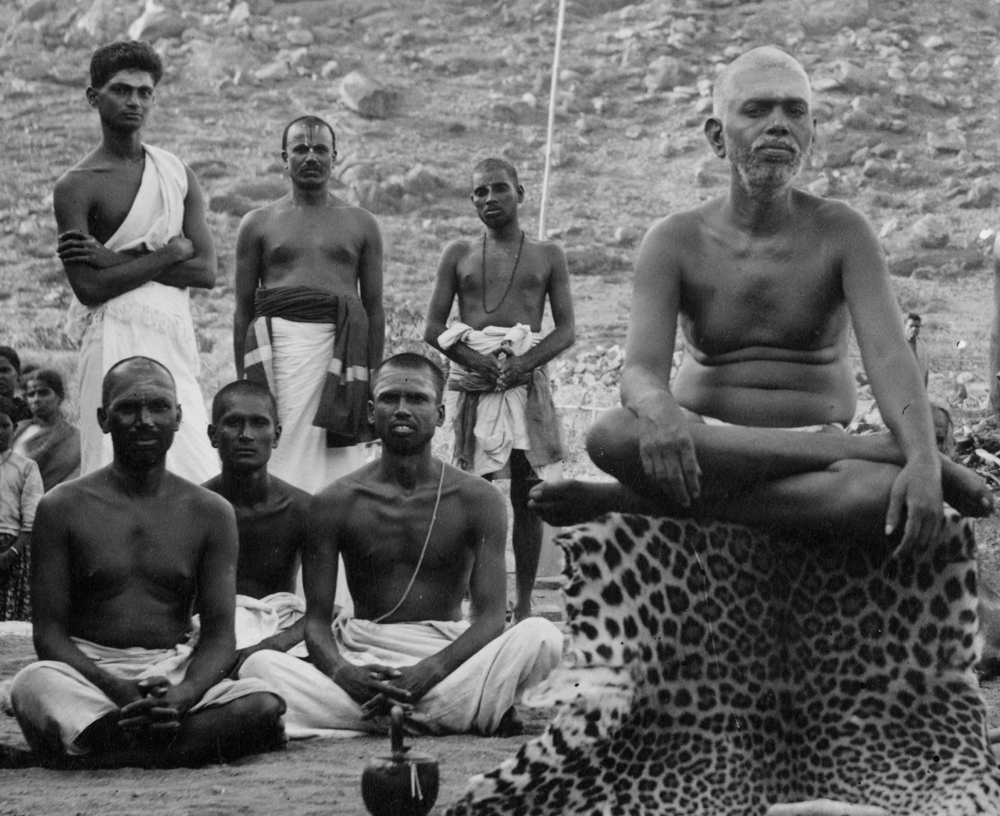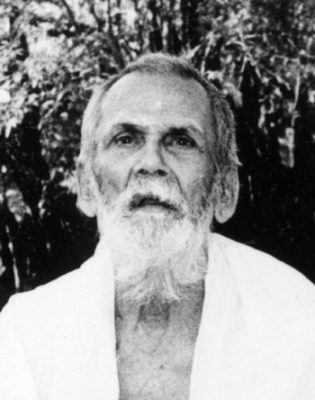
This extract comprises the first fifty-seven verses of Guru Vachaka Kovai, along with editorial notes and supplementary quotations from Bhagavan. The translated verses and Muruganar’s comments on them are in roman; the editorial comments and the additional quotations are displayed in italics. The various headings and subheadings are given in bold.
Prefatory verses
1 Obeisance to the Guru
1
The Guru abides without the base mental attitude of ‘I’ and ‘mine’, which exist through their dependence on erroneous understanding. He is the flame of bodha [knowledge] that will shine as the Self of the seeker, conferring such a clarity of knowledge in his heart, he will no longer be distressed by his longing for grace.
The idea being presented here is that once seekers have a direct experience of true knowledge, they will no longer pine for grace because they already have the full experience of it. The word bodha, translated here as ‘knowledge’, can be equated in this context with jnana, a Sanskrit word that was often used by Bhagavan to indicate ‘true knowledge’ or ‘knowledge of the Self’. Jnana is the state of irrevocable enlightenment. In it one knows oneself to be Atman (the Self) and Atman alone.
2
Even as I wallowed in misery, confounding myself with the form of the body, he [Ramana], banishing as ‘not “I”’ the dirty insentient body, lovingly ruled over me as the Guru who bestowed knowledge of the indestructible reality. May the feet of the Mauna Guru, benevolent grace itself, rest on my head!
Mauna means ‘silence’. In this context it denotes Bhagavan, the Guru who taught through silence and bestowed the direct experience of that silence on Muruganar.
3
The Guru, the Master of jnana, gives out clearly and concisely the true import of all the widely differing [scriptural] statements, skilfully establishing their relevance so that they are shown to be completely harmonised. May his feet rest upon my head!
Muruganar: To the sadhaka [spiritual practitioner] the arguments appear endless and contradictory, causing disturbing confusion. Unless the jnana experience arises, the harmony underlying the divergent arguments will not be revealed.
2 Name of the Work and its Origin
4
This bright clear ‘Lamp of Supreme Truth’ [Paramartha Deepam] was not one that I myself lit with my infantile and immature knowledge — I whose heart had not seen the truth shine. It was lit by my Lord Ramana with his ripe, supreme jnana.
The ‘Lamp of Supreme Truth’ is the original subtitle of Guru Vachaka Kovai.
5
The grace-bestowing Lord Ramana is the swarupa that shines as the Self, the reality that exists as self-effulgent being-consciousness. Of the many instructions he gave out to end the [mental] weakness and confusion [of sadhakas], I shall relate a few that have remained in my memory and which I have cherished in my heart.

‘Swarupa’ is one of the most common technical terms in this work. It is a Sanskrit word that is made up of two components: ‘swa’, meaning ‘one’s own’, and ‘rupa’, meaning ‘form’. Combined together the word means, ‘one’s inherent nature’, ‘one’s true form’. It often appears as a compound term with ‘Atma’, the Self. Atma-swarupa means ‘the intrinsic or true nature of one’s own Self’, or ‘the Self which is one’s true nature’.
In the Introduction it was explained that Muruganar generally showed Bhagavan verses which recorded his teaching statements on the day that they were composed. This particular verse, with its statement, ‘I shall relate a few that have remained in my memory and which I have cherished in my heart’, was composed after Bhagavan passed away and was first published in the 1971 edition. The final sentence probably refers to those verses which Muruganar lost and which he subsequently attempted to retrieve from his memory.
6
Abiding where Ramana embraced me, I dwelt there with my Lord and rejoiced with him. I will relate a fragment [of the teachings] on the nature of the Supreme Truth [paramartha dharma] that I realised in our life of union together.
7
Ramana, Guru and God, caused clear understanding to arise in me by destroying the veiling, the rising ego-sense. I shall now relate the teachings on the Supreme Truth that I discovered through the perspective of grace granted by him, and I shall string them together as a garland.
3 Benefit of the Work
8
Since the Supreme Self exists as all there is, there is nothing whatsoever for it to attain. Therefore, the benefit of this ‘Lamp of Supreme Truth’ is to bring about total cessation of mental movements towards dharma, artha and kama.
Traditional scriptures have identified four acceptable goals or ways of life:
Dharma: the performance of social duties in an ethical way.
Artha: the acquisition of wealth through righteous means.
Kama: the happiness derived from sensual enjoyments.
Moksha: liberation, the natural state of abiding as the Self.
Bhagavan is saying here that the Self is eternally attained or realised, and that one knows this when the mind stops running towards dharma, artha and kama. Having a mind that no longer pursues these three is the benefit of reading this work. A similar idea appears in verse 1,204 of this work.
The following story, narrated by Kanakammal, expands on this theme. In it the following works and authors are mentioned: Tiruvalluvar (also called Valluvar), author of the Tirukkural (also abbreviated as ‘the Kural’), an ancient Tamil book on dharma, artha and kama; Idaikkadar and Avvaiyar, who were contemporaries of Tiruvalluvar, were distinguished Tamil poet-saints.
Once, Bhagavan’s devotees were discussing Tiruvalluvar’s skill in condensing the greatest truths into the shortest of verses. Someone mentioned that Idaikkadar, one of the famous poets of the Sangam age, had composed a verse in praise of Tiruvalluvar’s unique ability. Idaikkadar says, ‘So much wisdom has been condensed into such compact verses that it seems as though Tiruvalluvar has drilled a hole in a single mustard seed and filled it with all the waters of the seven seas’.
Bhagavan, who was listening to this discussion, turned to Muruganar and said, ‘Hasn’t Avvaiyar condensed the Kural even further?’
To this query Muruganar replied, ‘Yes indeed! Avvaiyar has composed a poem of amazing brevity and unmatched beauty. It is an interesting story. Once, a group of poets were discussing the greatness of Tiruvalluvar and the unique nature of the Tirukkural. Avvaiyar was asked to give her opinion.
‘She said, “All of you seem to be highly impressed by the so-called brevity of the Tirukkural. But is it really so very concise and compact? Can a collection of 1,330 couplets, divided into 133 chapters, be thought of as being ‘brief’ or ‘concise’? I cannot see the need for so many verses just to tell us about virtue, wealth and happiness [dharma, artha and kama]. In my opinion the Tirukkural is an unnecessarily long composition.”
‘The other poets were taken aback by Avvaiyar’s words. They did not believe that the matter in the Tirukkural could possibly be condensed any further. So they challenged Avvaiyar to compose a really short poem which could be considered equal to the Tirukkural in brevity, clarity and beauty. Immediately Avvaiyar responded with the following poem:
‘Dharma is to give generously; artha is to earn wealth without resorting to unethical methods; kama is [the consequence of] a loving couple whose minds have become one and who are ever devoted to each other; the supremely blissful moksha is the state in which these three have been abandoned by meditation on the Supreme.’
Muruganar said, ‘Whereas Valluvar had dealt with the three subjects of virtue, wealth and happiness, Avvaiyar had included liberation also in her four-line poem. All the other poets were speechless with wonder.’
Bhagavan thoroughly enjoyed and endorsed the meaning of the verse. (Cherished Memories, pp. 132-3.)
9
One’s own real nature, the Self, which shines as the very essence of happiness, is the origin of all the pleasures in this world and the next. Because of its supreme eminence, the benefit of this work is to become firmly absorbed in that Self, without being assailed by thoughts of all the other states of attainment.
This is a continuation of the theme in verse 8. ‘The other states of attainment’ are those that are other than jnana.
4 Apology
It was traditional in ancient times for poets to present their new writings to a learned panel of scholars. In the preamble to these works it was customary for the author to ask these experts to ignore any defects in the text.
10
Upon examination, [it will be discovered that] this elegant Guru Vachaka Kovai was not sung by me, a dull-witted fool, through intellectual exertion. It was Venkatavan, divinity in human form, who, without conscious volition, caused me to sing it.
Venkatavan is a diminutive of Venkataraman, Sri Ramana’s birth name. Muruganar frequently uses it in his works.
11
Why should I offer an apologetic preface for a work that was not written by an ego-consciousness that proclaims itself to be ‘I’? The responsibility for this work belongs solely to that great being [Ramana] who is realised by the great ones in their hearts through mauna samadhi.
The word for ‘great ones’ — sandror — generally denotes people who excel in learning and virtuous behaviour. Muruganar makes it clear in other places that he is using the term to denote jnanis — those who have realised the Self — not merely scholars or virtuous men.
Samadhi is often taken to be a yogic state of absorption, but Bhagavan once defined it by saying, ‘Holding onto reality is samadhi’. (Talks with Sri Ramana Maharshi, talk no. 391.) Since mauna is the silence and stillness of the Self, mauna samadhi is the state of silence that is experienced when one is fully absorbed in the Self.
5 Dedication
12
By giving me this birth, my mother, who knew nothing of craftiness or clever talk, enabled me to destroy ignorance and attain the wealth of jnana. I therefore lovingly and whole-heartedly dedicate this work [to her], saying, ‘Let this work become an offering to my mother’s blessed heart’.
Muruganar dedicated two of his major works, Sri Ramana Sannidhi Murai and Guru Vachaka Kovai, to his mother.